Table of Contents
Do you hydrate yourself properly? Do you find yourself often feeling anxious? Is there any relation between your water intake and mood?
This article will explain everything in detail, from what dehydration is to what you can do to prevent it to the relationship between sufficient water intake and anxiety.
What are hydration & dehydration?
Before we get into dehydration, let’s define what hydration is.
Hydration is the process of having sufficient amounts of water or fluid to aid numerous processes in the body essential for maintaining physiological balance (1). Water is a vital component in the human body, essential for hydration and life (2). Roughly 60% of the adult human body is composed of water, and it is integral to the functioning of nearly all the body’s systems (3). Water helps to deliver oxygen and nutrients to cells, regulating several biochemical processes important for health and our mood.
Dehydration, on the other hand, is the lack of having enough fluid in the body, resulting in several bodily processes being compromised. Dehydration results from insufficient fluid intake or losing more water than you are replacing (4).
Sufficient water intake varies based on biochemical individuality and environmental factors. Stress, activity level, and climate all play a role, as do body composition and weight, which affect metabolic demands (5).
What is anxiety?
What exactly is anxiety? Anxiety is an amalgam of physical and mental signs and symptoms that can result in excess worry that disrupts daily functioning. Anxiety can result from a combination of factors, including:
- Genetics, trauma,
- Adverse childhood experiences
- Attachments with our caregivers
- Lifestyle factors: Lack of sleep, nourishment, or an imbalance in body systems.
Anxiety may manifest as restlessness, chronic worry, gastrointestinal issues, increased heartbeat, tremors, and racing thoughts (6). Anxiety disorders in the Diagnostic and Statistical Manual of Mental Disorders include Generalized Anxiety Disorder, Separation Anxiety Disorder, Selective Mutism, Specific Phobia, Social Anxiety Disorder, Agoraphobia, Substance or Medication-Induced Anxiety Disorder, and Panic Disorder (7).
Panic attacks also manifest like anxiety but in a more severe and acute form. The major difference is panic attacks have no identifiable trigger as compared to anxiety attacks (8).
Does dehydration cause anxiety? Underlying connections?
There are many conditions that cause anxiety, but anxiety and dehydration have different mechanisms at work, in which how much water you drink can influence your mood.
Can dehydration alone cause anxiety and panic attacks — Mechanisms
Water is involved in nearly all functions of the human body. When your body does not have enough water, it compromises these, including mood (9). Several studies have demonstrated an inverse relationship between anxiety and the hydration status of the body (10).
The mechanism underlying the hydration status of the body and anxiety involves our body’s sympathetic response. Our body has a fight-and-flight response system known as the sympathetic nervous system. When fluid in the body is less than required, this system releases some chemicals (neurotransmitters and hormones) (11).
These chemicals induce changes in heart rate and blood distribution. It even lowers the amount of blood flowing toward the brain and is imperative for healthy digestion and microbiome balance (12). These mechanisms affect multiple areas in the brain, including those heavily involved in emotional regulation. Disturbance in these areas from dehydration can contribute to symptoms of anxiety and depression (13).
Dehydration affects mood and causes cognitive disturbance. Thus, it affects mental performance overall. A greater than 2% reduction in body weight due to dehydration can lower alertness and cause tiredness. It also affects short-term memory and visual concentration, which increase with increased water intake (14).
Signs of dehydration
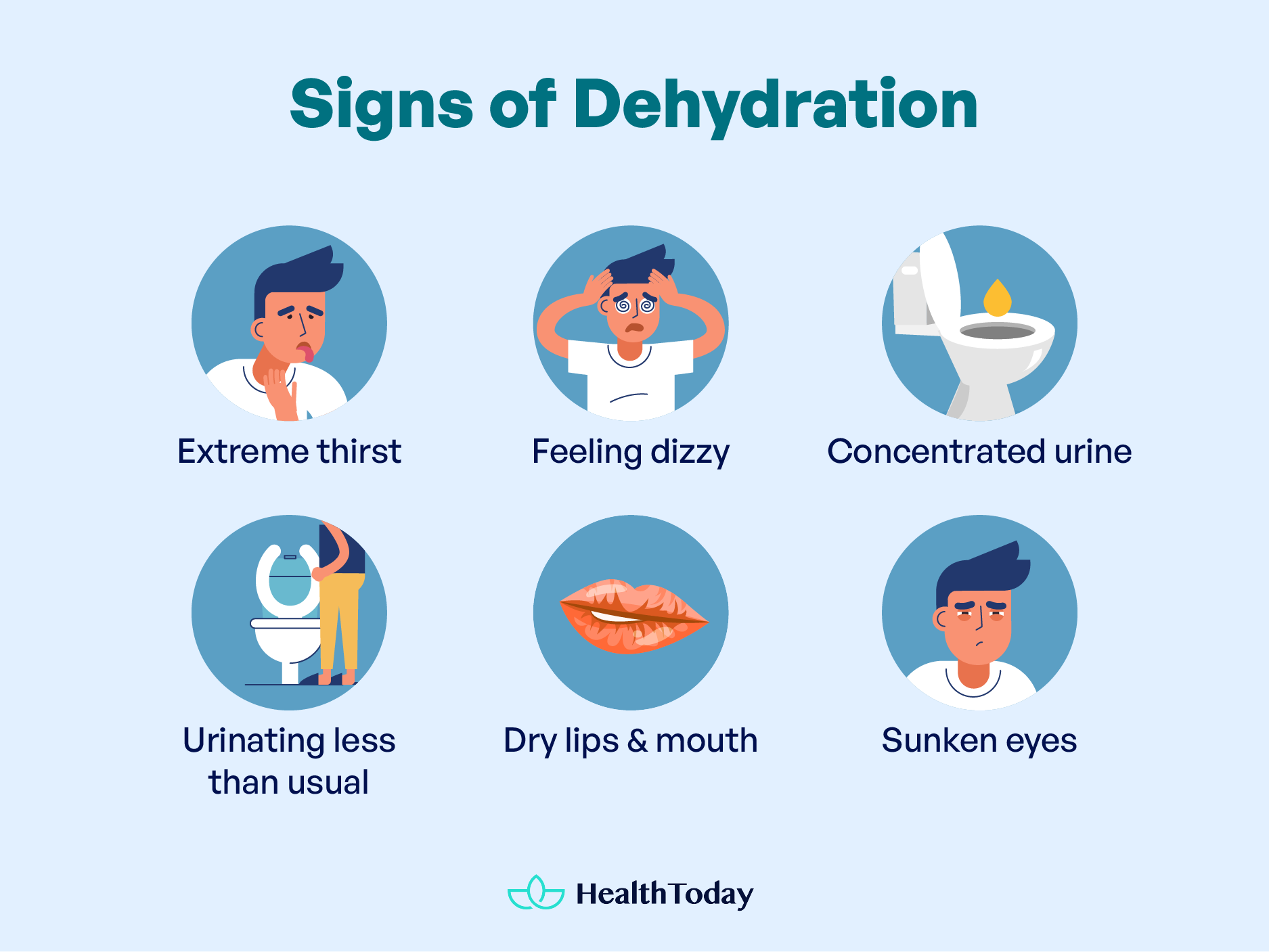
Following are the signs of dehydration that should not be ignored (15, 16):
- Extreme thirst is the most important sign that your body needs water
- Feeling dizzy
- Concentrated urine: dark yellow colored urine with a bad smell
- Urinating less than usual
- Dry lips and mouth
- Sunken eyes
Long-term dehydration can also cause constipation and kidney stones (17).
In infants, dehydration is deadly. The following signs and symptoms can indicate dehydration in infants (18, 19):
- Sunken fontanelle (soft depression on the head)
- Lack of tear production on crying
- Decreased number of wet diapers
- Somnolence
- Tachypnea (Increased respiratory rate )
- Irritability and fussiness
Severe dehydration that requires an emergency appointment includes (20, 21):
- Feeling confused or in an altered state of sensorium
- Lightheadedness on standing that persists for minutes
- Fits (seizures)
- Lack of urination for more than 8 hours
- Severe diarrhea, especially bloody diarrhea, over 24 hrs
- Weak pulse
Summary
Dehydration happens when the amount of fluid in the body is less than required. Several studies have shown an association between dehydration and anxiety.
Water is essential in many human body functions, including mood regulation.
Low water in the body activates reflex mechanisms that affect the brain region, which is important in modulating mood, hence leading to anxiety and depression.
Dehydration presents with excessive thirst, low urine, tachycardia, and even dizziness or fits in extreme cases.
Symptoms of anxiety
Anxiety can present in different forms (6):
- Generalized anxiety disorder: It includes worries about everyday life with physical manifestations as described below. To diagnose someone with generalized anxiety, symptoms should be present for at least six months.
- Panic disorders: A severe form of anxiety that occurs without any trigger
- Phobic disorders: fear of something that is not harmful, but you may perceive it dangerous, e.g., socialization (social phobia/anxiety) or going to heightened places.
Symptoms of anxiety range from mental stress to physical complaints. Anxiety is most commonly present through somatization. Somatization is the manifestation of mental illness through physical symptoms. It may be due to fear of stigma associated with mental disorders (22).
You may present with abdominal pain, and all your investigations rule out any pathological cause, while the actual reason may be mental disturbance such as anxiety or depression.
Manifestations of anxiety are as follows (22, 23):
- Unrealistic worry about everyday things
- Muscle tension
- Irritability
- Lack of concentration
- Abdominal pain
- Dyspepsia (indigestion)
- Insomnia (lack of sleep)
- Constant tiredness
- Chest pain
- Headaches
- Increased heart rate
- The feeling of impending attack
- Breathlessness in severe cases
- Tachypnea (Increased heart rate)
Risk factors that are associated with anxiety are (23, 24):
- Negative life events
- Family history of mental disorders
- Childhood pattern of being nervous, especially in new social settings
- Female
- Marital status: single
- Poor physical health
- Lower level of education
- Substance use disorder
- Child Abuse
Some medical conditions aggravate anxiety, such as (24, 25):
- Thyroid disorders
- Hormonal and gut imbalances
- Heart rhythm irregularities
- Medications and substances
- Some eating habits, such as excessive alcohol or caffeine.
- Dehydration
- Some people have food sensitivities; specific foods trigger anxiety in them.
Anxiety has different varieties, including panic attacks and phobic attacks. Generalized anxiety disorder involves every day worries. Most people with anxiety present with physical manifestations such as abdominal pain, chest pain, increased heart rate or respiratory rate. It is called somatization of anxiety. Risk factors for anxiety include child abuse, substance use disorder, poor health, and family history.
How to drink water to relieve anxiety?
You lose water every single minute you are breathing. Water is lost through urine, stool, breathing, and sweating. Water should be replenished to maintain normal homeostatic mechanisms of the body and also improve your cognitive function, including mood (10, 26).
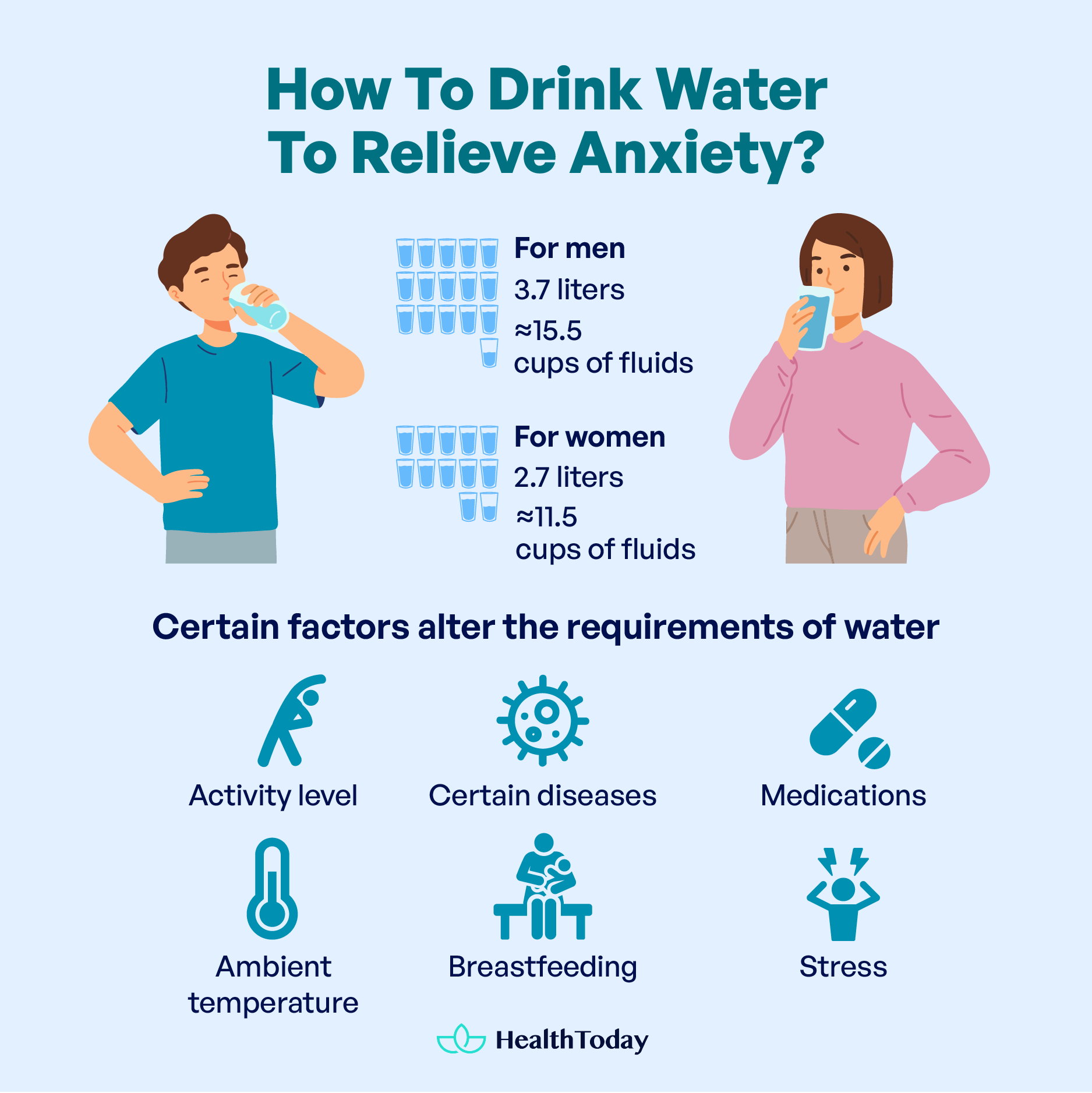
According to US National Academies of Sciences, Engineering, and Medicine, a healthy adult should consume (26):
- For men, 3.7 liters, which is around 15.5 cups of fluids
- For women, 2.7 liters, which is around 11.5 cups
This amount is not specific for water but includes all the fluids, such as beverages and other foods.
The amount of water you should drink is individualized and varies depending on numerous factors. Though the guidelines recommend a specific number of cups for healthy adults as described above, the following factors are important (26, 27):
- Exercise: If you have an active lifestyle or participate in physical games such as marathons, you probably lose more water than one living a sedentary lifestyle. This loss is through excess sweat, and it needs to be replenished accordingly. Not only water, sodium, which is lost through sweat should also be replaced.
- Ambient temperature: The region you live in is significant in determining your water intake. Hot weather can make you thirstier and require you to drink more.
- Certain health conditions: If you are experiencing an illness such as thyroid disease, you may need to increase your water intake. It is the same for certain kidney and liver disorders. Infections increase the basal metabolic rate and hence demand increased intake of water.
- Medications: Some medicines dehydrate you, such as antidepressants, while others retain water in the body, such as nonsteroidal anti-inflammatory (NSAIDs) commonly used as painkillers. Hence, water intake needs to be changed accordingly.
- Breastfeeding: If breastfeeding, you need more fluids to remain hydrated. Please note right after delivery, the chances of mental disorders also increase (28). So it’s better to avoid any trigger that can predispose to anxiety or depression, such as dehydration.
- Stress: All forms of stress can increase the need for sufficient fluid intake.
While all these factors are important, don’t underestimate the power of being attuned to your body. You know your body best. Mind-body attunement is the process of bringing awareness to our body’s signals and responding to them (29). This helps to address the needs being communicated by the body, supporting health and well-being.
If you’re feeling thirsty, that is a sign of dehydration— so try to be attuned to other indicators that may be more subtle and precede this. Equally important is the need to rehydrate and recharge with electrolytes— especially in the face of sufficient fluid loss. Electrolyte fluids may be an important approach in these cases as they are essential in rebalancing fluid concentrations in the body (30).
Research showed a significant reduction in anxiety and other mental disorders in those who drink more than five glasses of water a day. While those who had less than two glasses of water particularly experienced mood disorders (10).
To check if your water intake is adequate, keep an eye on the following things (26):
- You don’t feel a lot of thirst
- Your urine color is light yellow or almost colorless.
You lose water through sweat, urine, stool, and breaths. To replenish this loss, the US recommendation is 15.5 cups of fluids for men and 11.5 cups for women.
Certain factors alter the requirements of water, such as activity level, stress, certain diseases and medications as well as ambient temperature. Studies have shown a clear association between increased water intake and lower anxiety. If you don’t feel thirsty all the time or if your urine color is almost colorless, it indicates you are well hydrated. However, staying attuned to the subtle needs of your body is recommended.
Tips to stay hydrated
Hydration is important not only for mood disorders, as discussed in detail above, but also for other functions such as (27):
- Providing nutrition to your cells
- Preventing constipation
- Maintenance of body temperature
- Keeping an electrolyte balance
- Protection of vital organs
- Reducing friction in joints
Plain water is not the only option to fulfill your body’s requirements. Several water-rich foods can play the same role if taken in adequate amounts. Many vegetables and fruits are 100% water (26).
Following are the natural foods that are rich in water (26, 31):
- Cucumbers
- Lettuce
- Watermelon
- Boiled Chicken eggs
- Spinach
- Tomatoes
- Icebergs
- Oranges
Some people find drinking plain water bothersome as it is tasteless. You may purchase flavored water, or you can add flavors at home as follows (32):
- Addition of citric acid-containing foods such as lemon or oranges in water.
- You may add mint in crushed form in water
- You can add cucumber in small slices to the water
- Crushed berries can also be added
- Mix 12 ounces of sparkling water with one or two ounces of juice.
- Fresh ginger can also be used.
Even milk, juice, and herbal teas also add to your daily water intake. Though beverages and caffeinated drinks also provide water, be careful regarding them as they have added sugars that, in excess, are not good for overall well-being (26).
Ways to avoid dehydration
The following tricks can save you from becoming dehydrated (33):
- After you wake up early in the morning, the first thing you should do after face washing is drink a glass of water.
- Keep a nice glass water bottle around, one with measurements. It will remind you and help you monitor the amount of water you drink.
- Your body gives signals when dehydrated. Keep your eyes on these indicators, such as subtle mind-body cues, the color of urine, dry lips, or feeling thirsty more than usual.
- Drink a glass of water before every meal.
- Replace plain water with flavored water ( you can also make it at home as described above)
- Set a daily goal to increase your fluid intake slowly
How long does it take to truly rehydrate?
According to The Journal of Strength and Conditioning Research, if you are mildly dehydrated, it takes almost 45 minutes to 1 hour to adequately hydrate your body after 600 ml of water ingestion. Water takes the minimum time to absorb from the intestines (34).
What is the quickest way to rehydrate your body?
Plain water is absorbed from our intestines quickly within 5 minutes of drinking (35). Hence, this is the best drink to rehydrate ourselves quickly. Water is also calorie-free and easy to find in almost all circumstances (32). Please note if you are dangerously dehydrated, you will need intravenous rehydration instead of oral water (36).
What is the most hydrating drink ever?
Are bananas good for dehydration?
There is not much evidence regarding the hydrating ability of bananas. However, in people with dehydration, electrolyte imbalances can occur, especially in those who do a lot of physical activity and can develop low potassium levels along with dehydration. Bananas can help improve potassium levels and also provide calories (38).
Can you be dehydrated even if you drink a lot of water?
Yes, sometimes we drink an adequate amount of water and still feel thirsty and dehydrated. This indicates that there is a problem that is causing water loss constantly despite enough intake. It may be medications, diseases such as ongoing diarrhea, or you are sweating more than usual due to a change in activity level (39).
Hydration can be achieved with plain water and water-rich foods such as watermelon, cucumber, lettuce, oranges, and boiled eggs. Even milk, juices, and herbal teas can give water. Drinking water early in the morning, before meals, and keeping a water bottle with you all the time can help you avoid dehydration. Replacing plain water with flavored water also works.






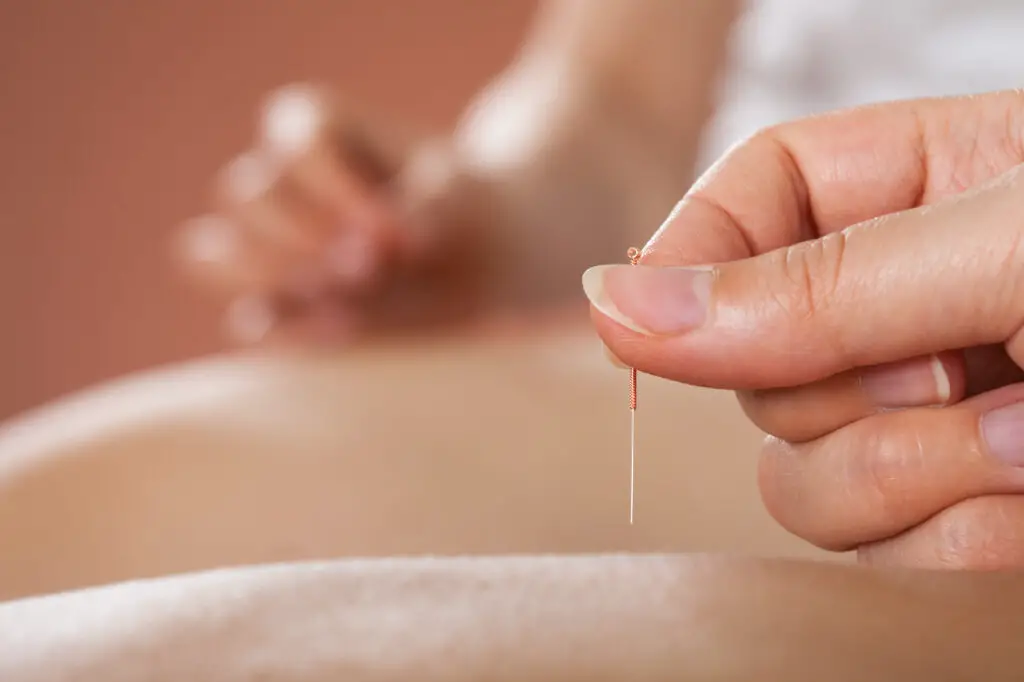

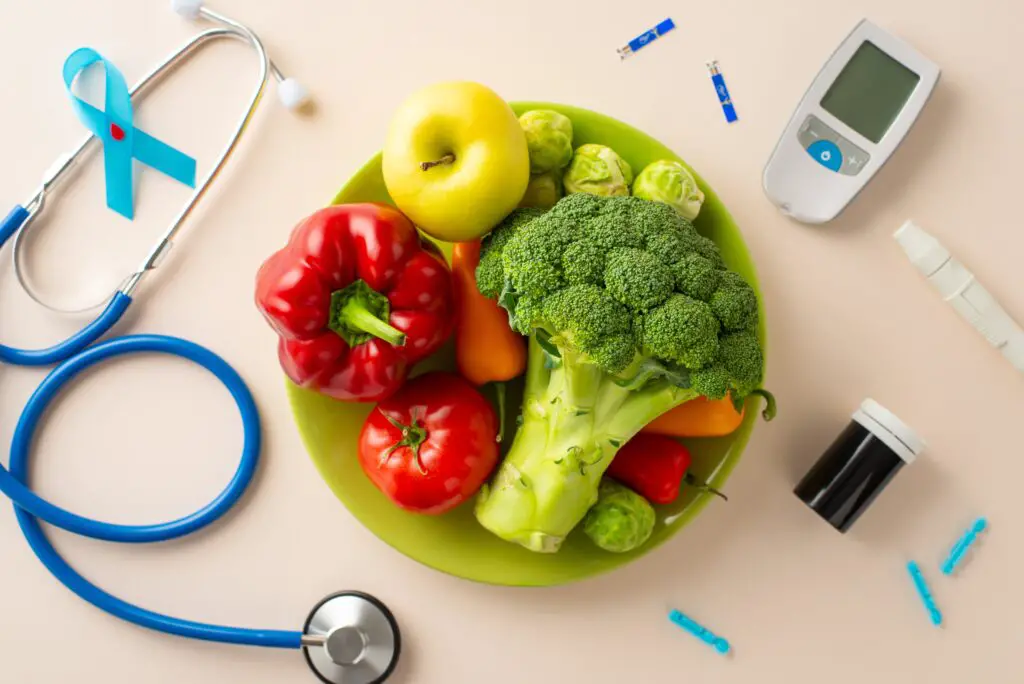
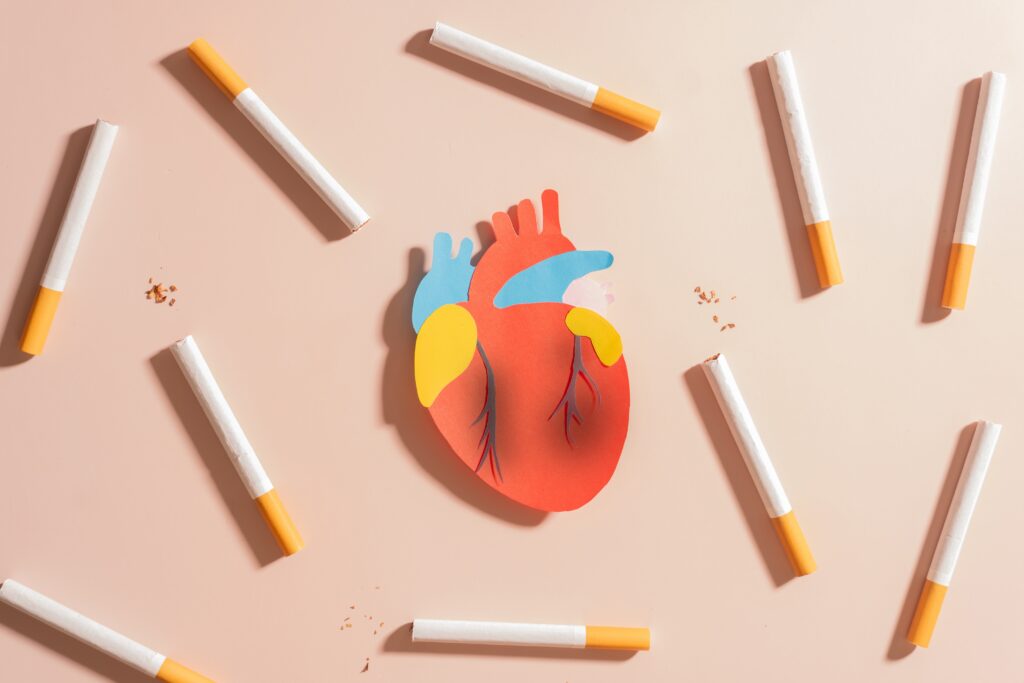
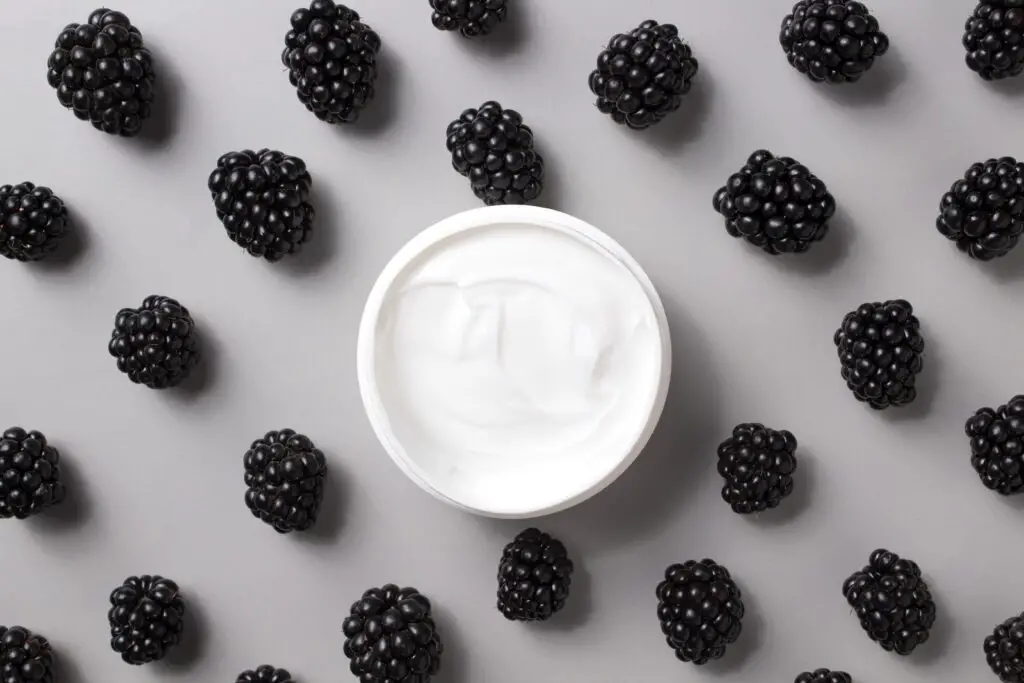



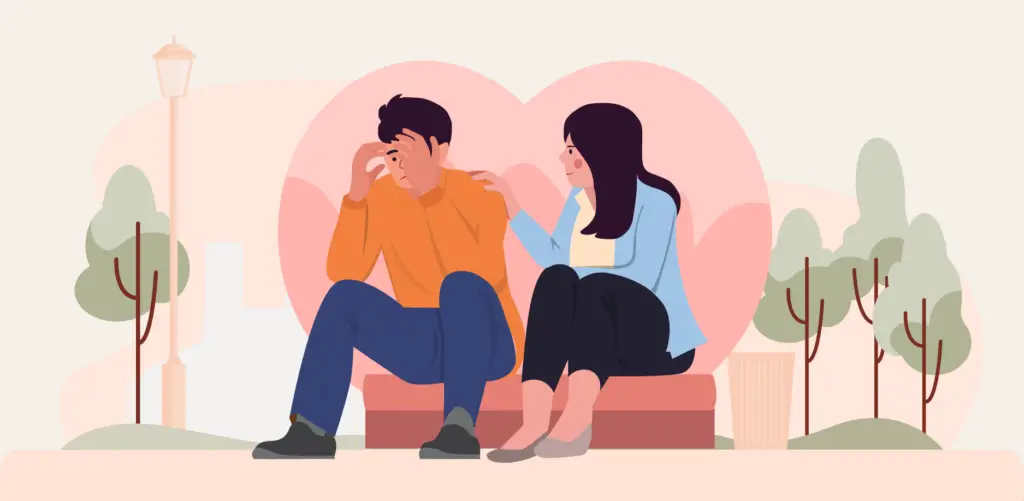

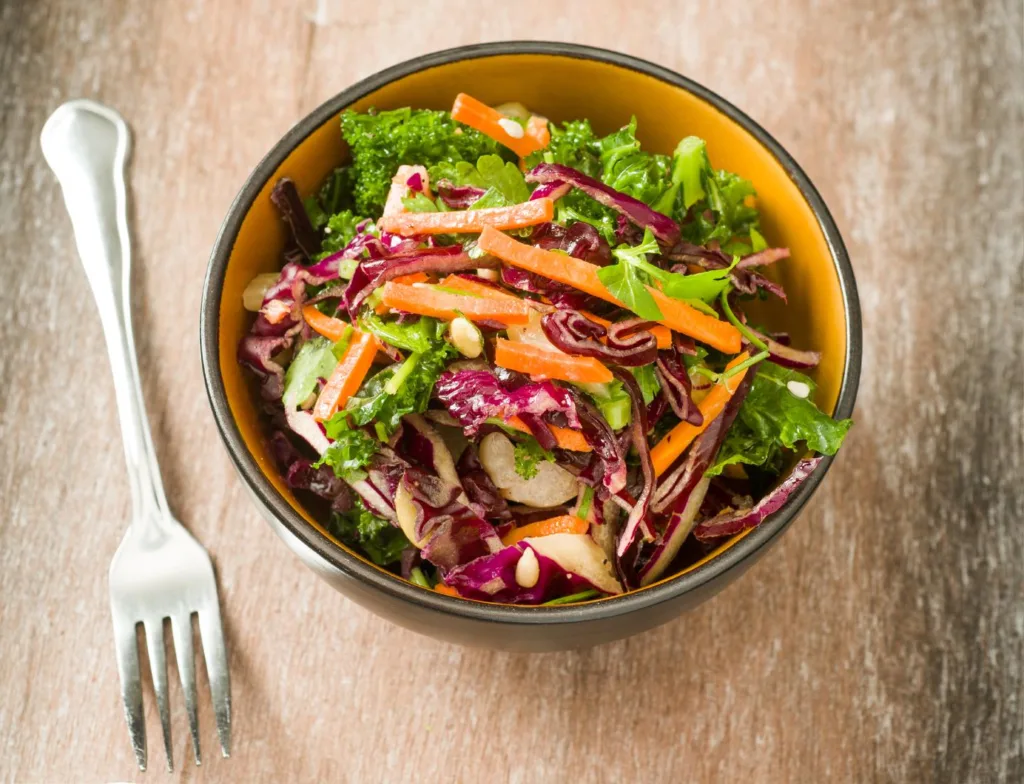
Comments
0